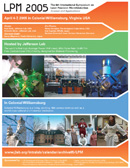6th International Symposium on Laser Precision Microfabrication 2005

Topics
LPM 2005 covers the topics listed below. In addition, there will be four special sessions devoted to aspects of laser material processing.
SPECIAL SESSIONS
Photochemistry
Free-Electron Laser Material Processing & Applications
High-power single-mode fiber lasers & novel applications
Laser Microfabrication of Glass/Ceramic Materials & Novel Applications
| Topics | |
|---|---|
|
|
Special Session 1 - Photochemistry
Session Organizers: Thomas Lippert (Paul Scherrer Institut, Switzerland) and Hiroyuki Niino (AIST, Japan)
In any laser material processing, the governing action is primarily dictated by the photochemistry or photophysics of the laser material interaction - a maxim that is more prevalent as processing dimensions approach the nanometer realm. A better understanding of these fundamental principles means better control and precision of the process. LPM 2005 will host a special session on photochemistry of laser material processing to explore the underlying principles in laser material processing.
Special Session 2 - Free Electron Laser Material Processing & Applications
Session Organizers: Fred Dylla (Jefferson Laboratory, USA) and Michelle Shinn (Jefferson Laboratory, USA)
Free Electron Lasers (FELs) have the unique advantage of providing high average power tunable laser radiation for high throughput material processing. Unlike in most high power material processing applications, in an FEL, the laser wavelength and pulse duration can be tuned to enhance a process. Jefferson Laboratory is the home of a KW class, MHz pulse rate (UV-IR-THz) FEL. LPM 2005 will host a special session on FEL material processing and applications. Papers will be accepted in FEL laser material interaction physics and FEL processing.
Special Session 3 - High-power single-mode fiber lasers & novel applications
Session Organizer: Isamu Miyamoto (Osaka University)
Fiber lasers have a lot of advantages such as excellent beam quality, extremely high conversion efficiency and very long life time in comparison with existing lasers such as Nd:YAG lasers and CO2 lasers, and can be operated without maintenance such as water-cooling and optical alignment. Materials processing has been improved very much by the advent of high-power single-mode fiber lasers. The future progress of the laser materials processing, without any doubt, strongly depends on the advance of the fiber laser technology. The LPM 2005 will host a special session of "High-power single-mode fiber lasers and applications to novel materials processing". Papers will be accepted in research or development of high-power single-mode fiber lasers with CW and pulsed operations. This session also welcomes scientists and specialists dealing with fundamentals of laser-matter interaction, and novel applications of high-power single-mode fiber lasers to microwelding, microsoldering, microcutting, microdrilling, marking, trimming, , sintering, and surface modifications.
Special Session 4 - Laser Microfabrication of Glass/Ceramics Materials and Novel Applications
Session Organizer: Kathleen Richardson (CREOL, School of Optics, University of Central Florida)
Lasers can play a strong role in the development of advanced technology devices and in instruments or components where glass or ceramic materials are used in lieu of other materials. Laser processing of glass or ceramic does not always have to be via a brute force energy deposition process. Glass chemistry and structure can be tailored for photosensitivity to enhance laser material processing at specific wavelengths permitting site-selective transformations (i.e., crystallization, phase transformation (amorphization) as well as ablation) that lead to a more controlled approach to material removal or alteration. Certain photo-structurable glass ceramic already exists and micro-fabrication experiments have shown the fidelity enhancement possible. The LPM 2005 will host a special session that invites glass/material scientists and laser processing experts to submit papers. Papers will be accepted in research or development of glass/ceramic materials designed for optical excitation and in laser processing techniques that use photo-chemical interactions in the glass to advantage. The session will also accept contributions on topics where either the glass or the processing of the glass material via laser photochemical means is used towards realization of components with novel properties for unique applications.


